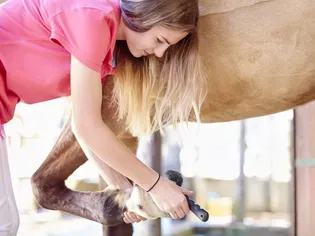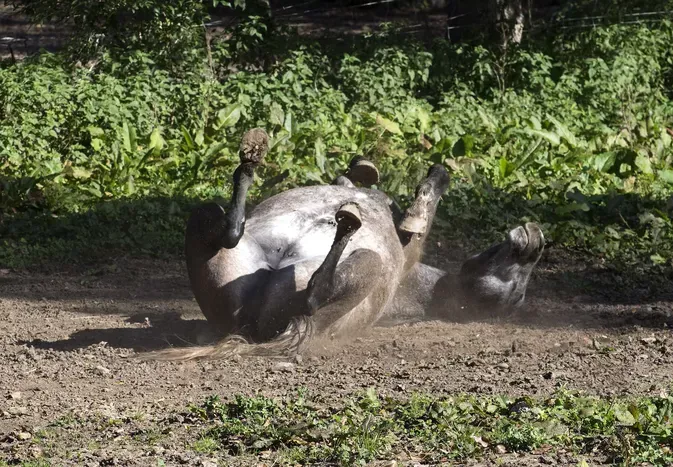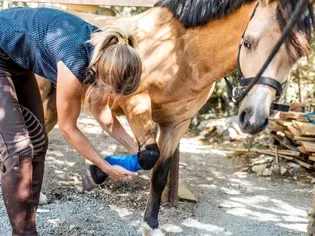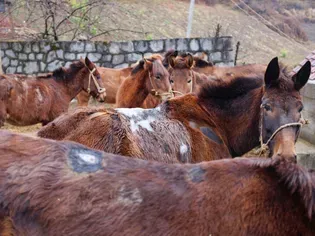Hay Belly in Horses
Updated on 04/26/24

Hay Belly in Horses: A Comprehensive Guide to Understanding, Prevention, and Treatment
Introduction
Hay belly, also known as ventral edema or pendulous abdomen, is a common condition in horses that affects the ventral (lower) abdominal region. It is characterized by a soft, doughy swelling that hangs below the midline of the abdomen, giving the horse a "pot-bellied" appearance. While hay belly can be a cosmetic concern for some owners, it can also be a sign of underlying health issues that require attention. In this comprehensive guide, we will explore the causes, symptoms, diagnosis, and treatment options for hay belly in horses.
Causes of Hay Belly
The primary cause of hay belly is the excessive consumption of low-quality hay or other high-fiber forage. When horses consume too much fiber, the cecum and colon, which are responsible for digesting fiber, become overloaded. This can lead to a build-up of gas and fluid, causing the abdomen to distend.
Other factors that can contribute to hay belly include:
* Dental problems: Horses with poor dental health may have difficulty chewing and digesting hay, leading to increased fiber intake and hay belly.
* Parasite infections: Internal parasites, such as roundworms and bots, can compete with the horse for nutrients and disrupt the digestive process, contributing to hay belly.
* Kidney disease: Horses with kidney problems may accumulate fluid in the abdomen, leading to hay belly.
* Liver disease: Liver disease can interfere with the horse's ability to metabolize nutrients and can cause fluid retention, including hay belly.
* Heart failure: Congestive heart failure can lead to fluid accumulation in the abdomen, causing hay belly.
Symptoms of Hay Belly
The most obvious symptom of hay belly is the soft, doughy swelling that hangs below the midline of the abdomen. This swelling may be more pronounced after the horse has eaten a large meal or when the horse is lying down. Other symptoms of hay belly can include:
* Lethargy
* Poor appetite
* Weight loss
* Diarrhea or constipation
* Colic (abdominal pain)
Diagnosis
Diagnosing hay belly involves a physical examination and a thorough history of the horse's diet and health. Your veterinarian will also likely perform blood tests and a fecal exam to rule out other underlying health conditions. In some cases, an ultrasound may be necessary to confirm the diagnosis and assess the extent of the fluid accumulation.
Treatment
The treatment for hay belly depends on the underlying cause. If the hay belly is due to excessive fiber intake, the veterinarian may recommend a diet change to reduce the amount of low-quality hay or other high-fiber forage in the horse's diet. In some cases, the veterinarian may also prescribe medications to help improve digestion and reduce gas production.
If the hay belly is due to an underlying health condition, such as parasite infection, kidney disease, liver disease, or heart failure, the veterinarian will need to treat the underlying condition first. Once the underlying condition is resolved, the hay belly should subside.
Prevention
Preventing hay belly is primarily about managing the horse's diet and overall health. Here are some tips for preventing hay belly in horses:
* Feed high-quality hay: Choose hay that is free of mold and dust and has a high nutrient content.
* Limit the amount of hay: Avoid overfeeding hay, especially low-quality hay.
* Provide plenty of water: Make sure the horse always has access to clean, fresh water.
* Regular deworming: Deworm the horse regularly to prevent parasite infections.
* Regular veterinary check-ups: Schedule regular veterinary check-ups to monitor the horse's health and ensure early detection of any underlying health issues.
Conclusion
Hay belly in horses is a common condition that can be
Explore More Pets

Pony Breeds
The Difference Between Horses and Ponies

Horse Diseases & Conditions
What Do I Do If My Horse Colics?

Pony Breeds
Horse and Pony Care by the Day, Week, Month and Year

Horse Grooming
Mange in Horses

Horse Diseases & Conditions
Grease Heel in Horses

Light Horse Breeds
Gypsy Vanner Horse Breed Profile

Horse Diseases & Conditions
Girth Galls and Saddle Sores

Pony Breeds
Shetland Pony Breed Profile